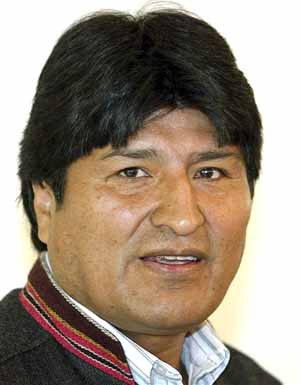Bolivia declares US ambassador persona non grata
La Paz -  Bolivian President Evo Morales ordered the US ambassador out of the country, accusing the diplomat of supporting the opposition as Morales faces escalating anti-government protests.
Bolivian President Evo Morales ordered the US ambassador out of the country, accusing the diplomat of supporting the opposition as Morales faces escalating anti-government protests.
"I declare the ambassador of the United States persona non grata," Morales said Wednesday on Bolivian television.
He accused Ambassador Philip Goldberg of supporting the opposition and their separatist aims. Foreign Minister David Choquehuanca was dispatched to advise Goldberg to leave the country at once, Morales said.
Washington rejected the accusations as "unfounded." US State Department spokesman Gordon Duguid said there had been no official notification of Morales' decision.
It came as the conflict between the leftist president and five eastern, opposition-controlled provinces had escalated in previous days.
Supporters of the pro-autonomy movement Wednesday overpowered police and soldiers protecting a regional tax office in Santa Cruz, a city 900 kilometres east of La Paz.
Police officers were beaten by the mob, national media said. Similar developments were reported from the opposition-controlled regions of Tarija, Beni and Pando.
The mob in Santa Cruz looted the offices of the state-run ENTEL telephone company and Television Boliviana, making off with equipment, while vandals in the streets set fire to office furniture and a vehicle.
Mobile phone and internet services were cut off, and contact between Santa Cruz and the rest of Bolivia was difficult.
General Marco Bracamonte warned that soldiers would use weapons from now on.
Opposition supporters also interrupted gas pipelines to Brazil, Argentina and the western regions of Bolivia, overpowering security and turning off supply. One pipeline to Brazil was destroyed in a bombing.
Cabinet head Alfredo Rada called the events the "start of a civilian coup against democracy." In a rally in La Paz, Morales supporters demanded stronger government action against violent opposition movements.
Coca farmers, who traditionally back Morales, set up roadblocks to interrupt supply for the opposition-controlled regions, which have been protesting for the past two weeks against the national government's use of taxes from national gas production to provide pensions for all Bolivians over 60.
A major factor behind the conflict between the wealthy descendants of European immigrants and the country's impoverished indigenous majority, led by Morales, are the government's attempts to redistribute wealth.
The Bolivian opposition has turned the pro-autonomy movement in several of the country's regions into a tool to attack the government.
Since the beginning of the year, citizens in four provinces have approved referenda by large margins for greater autonomy from the national government, which would grant them control over key natural resources, including natural gas.
The government's opponents accused Morales, who was elected in 2005 as the country's first indigenous president, of favouring indigenous people and keeping himself in power. (dpa)